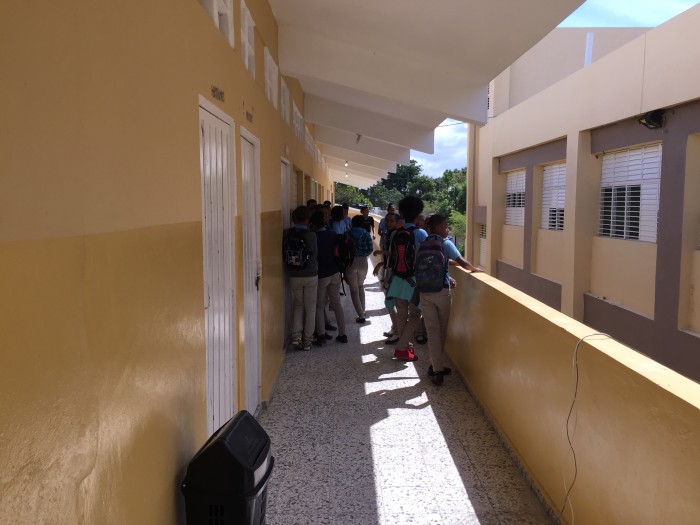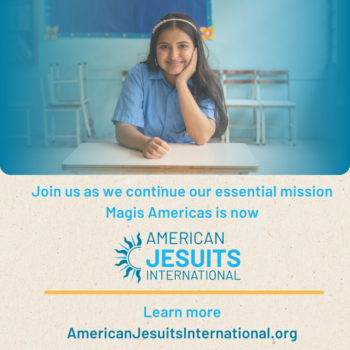A look at the education of the boys and girls of Batey Lechería.
The Centro Educativo Santo Niño Jesús school is located in the Batey Lechería area, Santo Domingo Oeste, in the Dominican Republic. The Batey Lechería community is a community of Haitian descendants, currently experiencing migration from very vulnerable sectors of the DR.
This educational center was founded by the Sisters of the Holy Child Jesus (SHCJ), a North American Congregation. They came to the DR in 1995, and from the beginning, were concerned with bringing quality education to those most in need. When the sisters arrived at Batey Lechería, this was a vulnerable area, whose only jobs were around cutting sugar cane, although a few women in the community were domestic workers in the city of Santo Domingo.
Before the arrival of the SHCJ Sisters, the Lechería community lacked basic services such as food, adequate housing, adequate water, health, and education. Additionally, the coexistence of the members of the community was not adequate, there was tension between the different immigrants.
The general education of the community before the arrival of the school was poor, there was not much thought about the future or regard for education as an important tool for development. Besides, the community was discriminated against due to the poverty level of its inhabitants.
Since the beginning of the Center, the SHCJ sisters, volunteers, teachers, assistants, administrators, and support staff promote objectives that link the good treatment between people, equal rights, creation of job opportunities, improvements to health, good nutrition, childcare, promotion of values and quality education for the excluded. We care about our students and work so receive a comprehensive and quality education; based on Christian values and respect for human rights. Furthermore, as the founder of Fe y Alegría José María Vélaz said, we maintain that “a poor person cannot have a poor education”. In the same way, the founder of the Congregation of the Holy Child Jesus, Cornelia Conelly says: “Actions, not words”, these conceptions are the basis for the mission, vision, principles, and values of the institution, which seek to activate the transformation of the context and improvement of the life of the community, through education and health.
I have worked at the Centro Educativo Santo Niño Jesús, since my adolescence, starting as a volunteer and occupying different positions. Today, as the Director of the Center, I have had the pleasure to see this community progressively change and advance. As a Center, we have contributed to the integral development of the community, emphasizing the importance of education and equality among human beings and the acceptance of people, regardless of their nationality, sex, religion, or origin.
We continuously work to answer the following questions: how do we deal with discrimination in the center? Is there discrimination between the actors of the educational community? Discrimination is something that occurs from person to person, from child to child. It is sad to say, but yes, discrimination exists between the same residents of one community. This is sometimes a culture assumed by boys and girls. To break these habits, the Center has implemented different activities, such as cultural weeks, the promotion of values, and general culture gatherings.
In the same way, we accept all students, providing equal opportunities. We do not condition education, all students have the same privileges in terms of the resources. Teachers integrate students equally, and an emphasis is made on respecting cultures and accepting people.
We also ask ourselves, has the Batey Lechería community changed? Has the school had any impact on this change? Yes, the community has changed with the collaboration of the Center, we have parents who value and support their children’s education from home, there are still many more to join, but we are firmly going down the right path.
Bartolo Álvarez, says that before, the young people of the community did not reach the third grade of primary school. Now, he has seen a change, young people finish secondary school. He tells us that the Center has been a torch of light for the community, for the progress of children and families. Since the arrival of the nuns, volunteers, and other collaborators an education based on infinite love has been provided to the youth of the community. These are people who live in extreme poverty, but every day wake up with faith and enthusiasm for life. It is for these people that the Center works to overcome inequality.
The Center has collaborated over the years in the development of the community, contributing to the well-being of adults, students, women, offering health programs, and community support. We have women like Rosy, who started a small business in the community, to guarantee the sustenance of her children, especially her little 8-year-old daughter.
Cristina Remarque has collaborated with the Center since she was nine years old, supporting young children who need help to focus in the classes. As she shares her knowledge with the little ones, she is motivated to continue in school and give her best. The Santo Niño Jesús school has accompanied this young woman on her path and we want to continue helping her in her studies, as she aims to go to college.
The Centro Educativo Santo Niño Jesús has managed to make progressive changes in the mentality of the people, we continue to fight against discrimination and inequality, giving a higher value to the education of children. To advance in offering quality education, and contributing to the development of the community, we need helping hands. Teacher training, maintenance, and the acquisition of teaching resources for our students, in these difficult times of a pandemic are essential. The Center, together with the infirmary, has worked hard to preserve the health of the community. We dream, create and believe in our people.
Since our foundation, we understood that we had to work together with the community, to achieve our common goals. We are firm believers that if the educational center advances, the community must also advance. We want to continue growing to improve the situation of our students, the families of the community, both in health and education.
I faithfully believe that the only way to break down social barriers is by teaching individuals to think, teaching them to be, to do, and to live together. At the same time, offering opportunities for transformation from accepting our identity and others as well as who we are.

